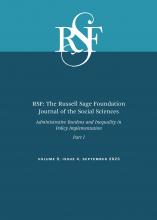Abstract
A 2015 policy change substantially increased the administrative burden involved in accessing health insurance for Pacific Islander immigrants in Hawaii. We examine the heterogeneous health-care use effects of this policy, which revoked Medicaid eligibility for these migrants and replaced it with access to subsidized private health insurance. Using data on the universe of hospitalizations and emergency room visits in Hawaii, we classify individuals as high or low risk based on their use in a baseline period. We then use a difference-in-differences strategy to estimate the effects of the policy on use, separately for low-risk and high-risk groups. The policy exacerbated health inequality: high-risk individuals experienced larger reductions in total use and larger increases in uninsured use.
- © 2023 Russell Sage Foundation. Akee, Randall Q., Timothy J. Halliday, and Teresa Molina. “Replacing Medicaid with an Imperfect Substitute: Implications for Health Inequality.” RSF: The Russell Sage Foundation Journal of the Social Sciences 9(4): 61–83. DOI: 10.7758/RSF.2023.9.4.03. We thank Nicholas Ziebarth and seminar participants at Hitotsubashi University, Essen Health Conference, and RSF for useful comments. Direct correspondence to: Randall Q. Akee, at rakee{at}ucla.edu, 6367 Public Affairs; 337 Charles E Young Dr E, Los Angeles, CA 90095, United States; Timothy J. Halliday, at halliday{at}hawaii.edu, 2424 Maile Way; 533 Saunders Hall; Honolulu, HI 96822, United States; Teresa Molina, at tmolina{at}hawaii.edu, 2424 Maile Way; 515A Saunders Hall; Honolulu, HI 96822, United States.
Open Access Policy: RSF: The Russell Sage Foundation Journal of the Social Sciences is an open access journal. This article is published under a Creative Commons Attribution-NonCommercial-NoDerivs 3.0 Unported License.






